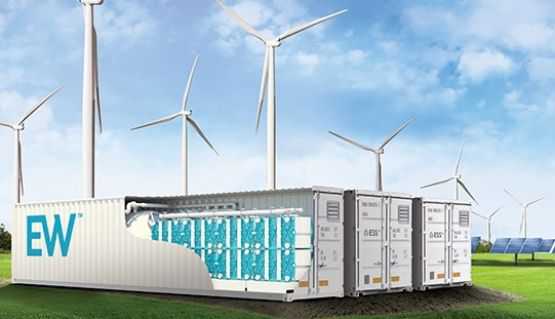‘All-iron’ flow electric battery maker ESS Inc launches ‘configurable’ megawatt-scale product

Image: ESS Inc via Facebook, cropped for the site by Andy Colthorpe.
ESS Inc, the US-headquartered manufacturer of a good flow battery using iron and saltwater electrolytes, has launched a fresh range of energy storage systems beginning at 3MW ability capacity and promising 6-16 hours discharge length.
The company announced the release of the ESS Inc Energy Center the other day, a containerised utility-scale energy storage product targeted at serving front-of-the-meter use cases in addition to larger commercial and professional (C&I) site applications. Predicated on ESS Inc’s second generation of flow electric battery modules, the solution was created to support large-level renewable energy projects, serve transmitting and distribution (T&D) applications and offer peaking energy ability to replace peaker gas plants.
ESS Inc’s previously obtainable program was called the Strength Warehouse, a good 75kW / 500kWh solution. Unlike Energy Warehouse, Energy Centre is configurable and can end up being scaled and custom-crafted to meet up a wider selection of specific project sizes, the business said. It can also stack multiple applications to increase revenues or energy cost savings.
While others in the flow battery space have largely centered on vanadium or zinc-bromine electrolyte, ESS Inc has been bullish on the potential for its ‘all-iron’ flow battery. It includes a claimed 25-time expected lifetime without effectiveness degradation and the business claims it is secure: in a 2018 interview CEO Craig Evans told Energy-Storage.news a report from a good fire marshall on the electric battery chemistry “was [just] 3 sentences long on how the fire marshal should cope with our battery in the event of a meeting”. Meanwhile the battery's contents will be non-toxic and are certainly not made using rare-earth resources or hazardous chemicals, the company claimed.
For the reason that 2018 interview Evans had conceded that lithium-ion batteries had the large head start on manufacturing scale and cost reduction on newer electric battery technology like his company’s, but that technical advantages including the ESS Inc movement battery’s operating temperature of 50°C - meaning it doesn’t need HVAC answers to be deployed in sizzling environments - and ever-cheaper renewable energy could offer market opportunities.
ESS Inc was among a handful of flow battery manufacturers interviewed for that feature article a year or two back, along with vanadium redox circulation battery (VRFB) businesses VRB Energy and redT (the latter nowadays part of Invinity Strength Systems carrying out a merger with Avalon Electric battery) and zinc bromine move battery company Primus Power.
“[Lithium battery storage companies] have warranty issues, augmenting the pack as time passes. Deploying it in sizzling hot environments, they won’t manage to meet the effectiveness requirements because they’ve acquired big HVAC loads. Our battery operates at 50°C.
“That’s what’s got their foot in the door, history, the consumer electronics and EV market segments. Where these movement batteries really come into the marketplace and long duration really gains is with low cost renewables. I think you’ll see a lot more movement batteries out there. Deployments are certain to get you extra deployments,” Evans explained at the time.
Solar-powered energy project developer David Dark brown, a co-founder and senior principal at Obsidian Renewables, said his company was “worked up about the economics, functioning life and design overall flexibility that the ESS Energy Middle solution offers”.
“An instant and dramatic change is occurring that favors pairing larger-scale electric battery installations with renewables. These jobs have found improved overall customer benefit from much longer duration, daily cycling and the overall flexibility to adjust to evolving use conditions that are not constrained by cycle lifestyle.”
The company has manufactured numerous demonstration project deployments in territories including Brazil and Germany and gained investors including Expenses Gates' Breakthrough Energy Ventures, Softbank Group’s SB Energy subsidiary and chemicals company BASF because the company was established in 2011. In 2019, insurance provider Munich Re launched a long-term coverage plan for battery efficiency with a term of a decade and registered ESS Inc as its 1st customer.
“We are very very happy to introduce and deliver the only truly environmentally safe, highly versatile and customizable, long-duration storage solution to the market. The option of a low-expense, ultra-long-life energy storage solution with the cheapest environmental impact can help reduce client costs and meet the virtually all stringent sustainability goals,” CEO Craig Evans said in a news release announcing the Strength Center’s launch.
“Based on the rapid and continued expansion of renewable means that are driving strength markets, long-duration storage alternatives like ours will help catalyse the strength transition and tackle environment change head on.”
Source: https://www.energy-storage.news
Previous Story
- Burning wood waste for energy increasing in timber-rich...
- Multiple regulators resulting in increased tariffs in energy...
- Salman: Economic diplomacy to keep with major global...
- Nano tech smart-window offers you air-conditioning without the...
- Power price hike to hid hard Bangladesh industries,...
- Stocks rebound strongly on Bangladesh Bank’s special fund
- Metito-led consortium wins 55MWe solar project with $0.0748/kWh...
- Tiger Energy agents visit BD